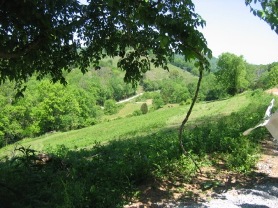|
Home
Letter to the Selective Service The Christian Alternative to Public Insurance
|
Buffalo Valley Christian FellowshipGeneral Assembly and Church of the First BornA First Century Christian CommunityWhy The Seventh Day Sabbath?
Thus the heavens and the earth were finished, and all the host of them.
And on the seventh day God ended his work which he had made; and he rested on the seventh day from all his work which he had made.
And God blessed the seventh day, and sanctified it: because that in it he had rested from all his work which God created and made.
For he spake in a certain place of the seventh day on this wise, And God did rest the seventh day from all his works.
There remaineth therefore a rest to the people of God.
For he that is entered into his rest, he also hath ceased from his own works, as God did from his.
Is the Sabbath in the New Testament? The "New Testament" came into effect at the death of Christ.
Christ "is the mediator of the new testament, that by means of death,
For where a testament is, there must also of necessity be the death of the testator.
For a testament is of force after men are dead: otherwise it is of no strength at all while the testator liveth."
Yet, immediately after the death of Christ, the Gospel of Luke tells us:
Christ predicted that the sabbath day would still be observed in A.D. 70 as the Christians were fleeing the Destruction of Jerusalem by the Romans:
The early Church kept the sabbath as recorded in the Book of Acts:
And on the sabbath we went out of the city by a river side, where prayer was wont to be made; and we sat down, and spake unto the women which resorted thither.
And Paul, as his manner was, went in unto them, and three sabbath days reasoned with them out of the scriptures,
At the resurrection, in the New Heavens and New Earth, the sabbath will still be in force:
For as the new heavens and the new earth, which I will make, shall remain before me, saith the LORD, so shall your seed and your name remain.
And it shall come to pass, that from one new moon to another, and from one sabbath to another, shall all flesh come to worship before me, saith the LORD.
The Sabbath is Eternal
And the LORD spake unto Moses, saying,
Speak thou also unto the children of Israel, saying, Verily my sabbaths ye shall keep: for it is a sign between me and you throughout your generations; that ye may know that I am the LORD that doth sanctify you.
Ye shall keep the sabbath therefore; for it is holy unto you: every one that defileth it shall surely be put to death: for whosoever doeth any work therein, that soul shall be cut off from among his people.
Six days may work be done; but in the seventh is the sabbath of rest, holy to the LORD: whosoever doeth any work in the sabbath day, he shall surely be put to death.
Wherefore the children of Israel shall keep the sabbath, to observe the sabbath throughout their generations, for a perpetual covenant.
It is a sign between me and the children of Israel for ever: for in six days the LORD made heaven and earth, and on the seventh day he rested, and was refreshed.
When Did God Change the Sabbath from the Seventh Day (Saturday) to the First Day (Sunday)? There is no place in the Bible where God commanded the Sabbath to be on another day. The term "first day of the week" as found in Acts 20:7 and 1st Corinthians 16:2 is used to justify a Sunday Sabbath. In both cases, the the term "first day of the week" is incorrectly translated from the Greek text, where it is called "the first of sabbaths", or "Mia Sabbaton". The Latin Vulgate also is rendered in Latin as the "first of Sabbaths", and not the "first day of the week." The term "first of sabbaths" is used for the Feast of First Fruits, which is the beginning of the "week of weeks", or 7 weeks until Pentecost. Christ walked in the fields on the second sabbath of this week (Luke 6:1) In both accounts, the "first of sabbaths" is just prior to Pentecost, since it is 49 days prior. (Acts 20:16, 1st Corinthians 16:8) This indicates a yearly feast day, and not a weekly occurrance. It was during this time that a collection was taken up by Paul for those in Jerusalem, in accordance with Deuteronomy 16:9-11. It was on the "first of Sabbaths" (John 20:1) that Christ said "Touch me not; for I am not yet ascended to my Father: but go to my brethren, and say unto them, I ascend unto my Father, and your Father; and to my God, and your God." (John 20:17) Yet later, on that very same day, Christ let his disciples inspect His wounds. (John 20:19-20) For just as the wave offering for the feast of First Fruits was made on the "morrow after the sabbath" (Leviticus 23:11), so was Christ presented to the Father as the perfect wave offering of the "first fruits from the dead." (1 Corinthians 15:20-23) This is what happened on the Sunday after the Lord was resurrected, for there was not a change in the Sabbath day. Regardless, there is no commandment in the Bible that ever changed the Sabbath day to another day. |

|




